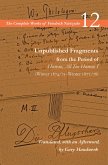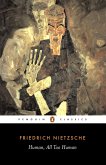The publication of Human all-too-Human extends over the period 1878-1880. Of the two divisions which constitute the Second Part "Miscellaneous Maxims and Opinions" appeared in 1879 and "The Wanderer and his Shadow" in 1880 Nietzsche being then in his thirty-sixth year. The Preface was added in 1886. The whole book forms Nietzsche's first lengthy contribution to literature. His previous works comprise only the philological treatises The Birth of Tragedy and the essays on Strauss Schopenhauer and Wagner in Thoughts out of Season.With the volumes of Human all-too-Human Nietzsche appears for the first time in his true colours as philosopher. His purely scholarly publications his essays in literary and musical criticism-especially the essay on Richard Wagner at Bayreuth-had of course foreshadowed his work as a thinker.
Hinweis: Dieser Artikel kann nur an eine deutsche Lieferadresse ausgeliefert werden.
Hinweis: Dieser Artikel kann nur an eine deutsche Lieferadresse ausgeliefert werden.








